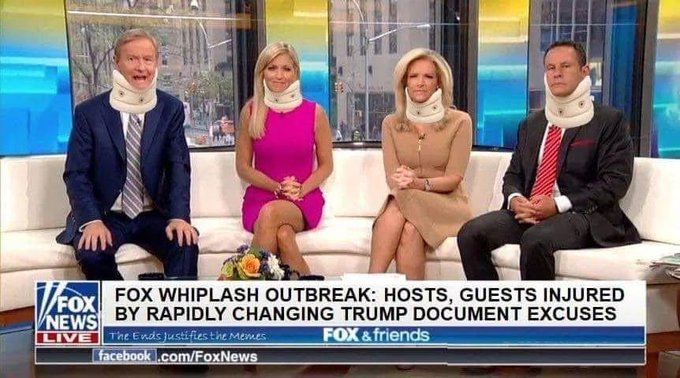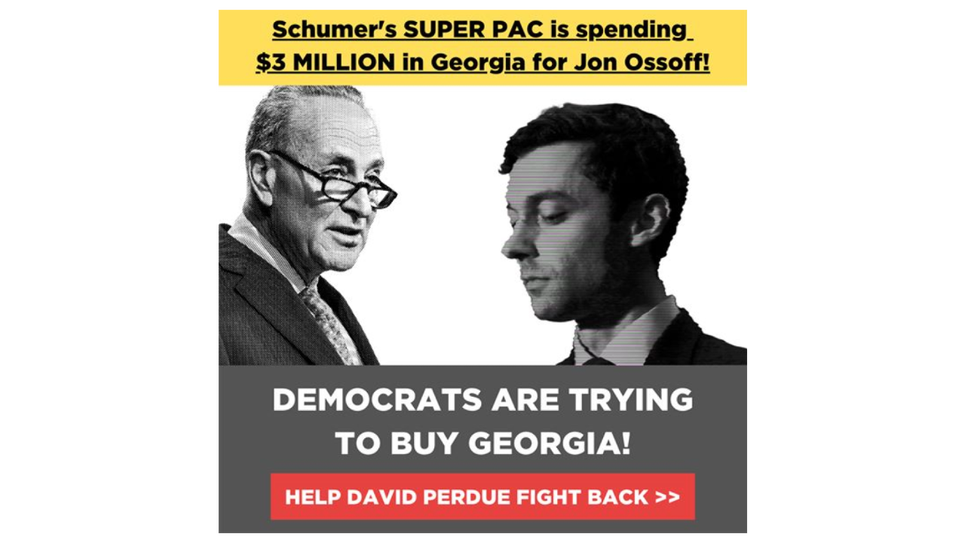....editing sound / video to promote a political agenda?
(Apologies for the long post to follow....)
We are all well aware of how social media (and even media in general) has been a detriment to society in some aspects, specifically in how false information is virally spread to people to affect their opinions.
So how do we put a stop to it?
Specifically, I am talking about what legal action can be taken currently (and/or what changes should we make if the current laws do not properly address the issue) to go after the Photoshop Warriors who have made a living off of altering photos for the purpose of promoting an agenda?
For example, in the Mar-A-Lago thread, the following picture was just added:

This is obviously an image that is considered satire and should be considered "safe" from any kind of prosecution. This firmly falls into the "freedom of speech" type of argument that I am fine with.
But let's look at another example. This is the image from David Perdue's (Georgia) campaign team back in 2020 where they "accidentally" increased the size of Ossoff's nose to "enhance" his Jewish features in order to make him less appealing.

Shouldn't this fall under a form of defamation or slander?
Same thing with edited video. There was a video posted a few days ago that was Desantis and Hannity talking about the Mar-A-Lago raid and it was a fake video that was edited from footage from a previous interview a year ago. It was found out to be fake and addressed accordingly, but it already added a little fuel to the fire that is already polarizing opinions. On the other side, there was a photo of the judge in the Mar-A-Lago raid that was edited from an old Epstein / Maxwell photo that was actually shown on Fox News and promoted as real. Proven fake thereafter, but still not helping matters.
So those are examples of people editing media in a manner that is in no way could be considered a parody or for entertainment purposes only. While "lying" is certainly not illegal in most cases, I would think that most of these types of media alteration could fall into the definition of defamation that could be proved in court.
Now, I am well aware of how difficult it would be to prove / hunt down the individuals who are responsible for most of these. I suspect that they alter the media and upload to social media which is then protected under the current content laws for that very reason.
However, I really do think that a decent chunk of the partisanship in this country is being fueled by altered media like this. Even when they are exposed as fake, often the damage has already been done and most of the people who read / received the original fake media never find out about it. It's not like their Facebook feeds offer a retraction to a post that you have received with the false media.
Also, things are only going to get worse. Deepfake technology is getting easier to create and make believable every day. It is not going to be long before we get to the point where it is nearly impossible to tell a fake from the real thing without specific training in that science. And let's face it, a lot of people are already very easily duped by this kind of thing because they want to believe it enough that they don't even question it anymore.
So what is the solution? I believe that the lack of prosecution of these kinds of changes has only emboldened people to keep doing it more and more. Is it a pipe dream to think that we can somehow go after these people due to a lack in technology to catch them, or are the penalties so light that it's not even worth the effort to try and convict? I imagine that the current penalty for prosecuting someone has to be tied to the damages that the targeted recipient suffers, but that is always fairly hard to prove. Is there a standard penalty that could be imposed (major fine? minor jail time) that we could put in place to send a message that this is no longer OK?
(Apologies for the long post to follow....)
We are all well aware of how social media (and even media in general) has been a detriment to society in some aspects, specifically in how false information is virally spread to people to affect their opinions.
So how do we put a stop to it?
Specifically, I am talking about what legal action can be taken currently (and/or what changes should we make if the current laws do not properly address the issue) to go after the Photoshop Warriors who have made a living off of altering photos for the purpose of promoting an agenda?
For example, in the Mar-A-Lago thread, the following picture was just added:

This is obviously an image that is considered satire and should be considered "safe" from any kind of prosecution. This firmly falls into the "freedom of speech" type of argument that I am fine with.
But let's look at another example. This is the image from David Perdue's (Georgia) campaign team back in 2020 where they "accidentally" increased the size of Ossoff's nose to "enhance" his Jewish features in order to make him less appealing.

Shouldn't this fall under a form of defamation or slander?
Same thing with edited video. There was a video posted a few days ago that was Desantis and Hannity talking about the Mar-A-Lago raid and it was a fake video that was edited from footage from a previous interview a year ago. It was found out to be fake and addressed accordingly, but it already added a little fuel to the fire that is already polarizing opinions. On the other side, there was a photo of the judge in the Mar-A-Lago raid that was edited from an old Epstein / Maxwell photo that was actually shown on Fox News and promoted as real. Proven fake thereafter, but still not helping matters.
So those are examples of people editing media in a manner that is in no way could be considered a parody or for entertainment purposes only. While "lying" is certainly not illegal in most cases, I would think that most of these types of media alteration could fall into the definition of defamation that could be proved in court.
Now, I am well aware of how difficult it would be to prove / hunt down the individuals who are responsible for most of these. I suspect that they alter the media and upload to social media which is then protected under the current content laws for that very reason.
However, I really do think that a decent chunk of the partisanship in this country is being fueled by altered media like this. Even when they are exposed as fake, often the damage has already been done and most of the people who read / received the original fake media never find out about it. It's not like their Facebook feeds offer a retraction to a post that you have received with the false media.
Also, things are only going to get worse. Deepfake technology is getting easier to create and make believable every day. It is not going to be long before we get to the point where it is nearly impossible to tell a fake from the real thing without specific training in that science. And let's face it, a lot of people are already very easily duped by this kind of thing because they want to believe it enough that they don't even question it anymore.
So what is the solution? I believe that the lack of prosecution of these kinds of changes has only emboldened people to keep doing it more and more. Is it a pipe dream to think that we can somehow go after these people due to a lack in technology to catch them, or are the penalties so light that it's not even worth the effort to try and convict? I imagine that the current penalty for prosecuting someone has to be tied to the damages that the targeted recipient suffers, but that is always fairly hard to prove. Is there a standard penalty that could be imposed (major fine? minor jail time) that we could put in place to send a message that this is no longer OK?

